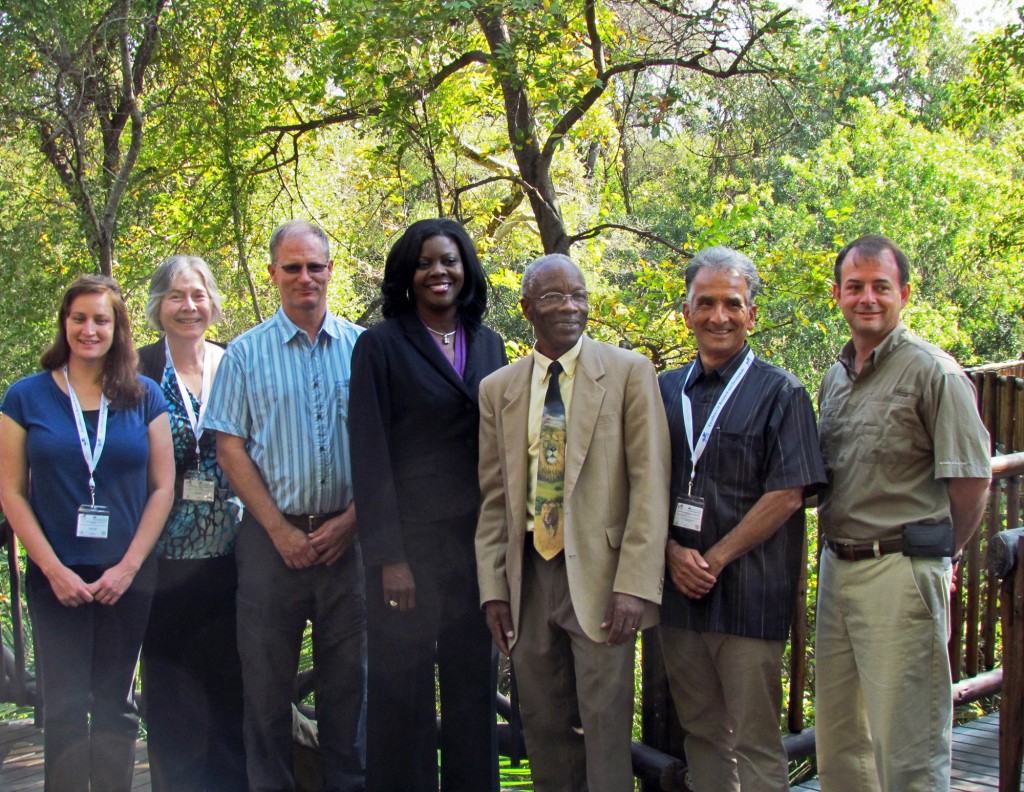
Common Bean Disease Workshop on Angular Leaf Spot and Root Rots
Protea Hotel Kruger Gate, Skukuza, South Africa, July 20-23, 2015
The USDA-ARS Feed-the-Future Grain Legumes Project, in collaboration with ARC South Africa, hosted a consortium of 65 bean scientists from 14 countries, including: 35 participants from 10 African countries, 9 participants from 3 South American countries, and 21 participants from the U.S. including 4 USDA-ARS scientists that represent the ARS-FtF Grain Legumes Project. Three ARS Administrators were also in attendance including Dr. Roy Scott, Dr. Eileen Herrera, and Dr. Chavonda Jacobs-Young who presented Certificates of Appreciation to three outstanding partners who had made significant contributions to the ARS-FtF Grain Legumes Project.

SEVEN ARS PARTICIPANTS – left to right Karen Cichy, Eileen Herrera, Phillip Miklas, Chavonda Jacobs-Young, Roy Scott, Talo Pastor Corrales and Timothy Porch.
Other organizations participating in and/or sponsoring the event included CIAT, PABRA (Pan Africa Bean Research Alliance), USAID- Legume Innovation Lab, and the Kirkhouse Trust (African Bean Consortium). Event sponsors included Dry Bean Producers Organization (DPO), Pannar Seed, and Syngenta South Africa.

AWARDEES – receiving Certificates of Appreciation from Dr. Jacobs-Young for contributions to the ARS-FtF, Grain Legumes Project included L-R Dr. Deidre Fourie, Plant Pathologist, ARC, South Africa, Dr. Susan Nchimbi-Msolla, Plant Breeder and Geneticist, Sokoine University of Agriculture, Tanzania, and Dr. Consuelo Estevez de Jensen, Plant Pathologist, University of Puerto Rico.
The workshop addressed two common bean diseases of global significance, angular leaf spot which is the most critical disease problem of beans grown in Africa and South America, and root rots which are endemic worldwide. The first two days of the workshop consisted of presentations by keynote speakers and participants concerning the past, present, and future research needs for combating these major disease problems. During the third day participants were split into four working groups: angular leaf spot pathology, angular leaf spot breeding, root rot pathology, and root rot breeding, with each group responsible for presenting future research needs. The fourth day was used for presentations by experts to update the participants on breeding for resistance to bruchid seed weevils and important bean diseases caused by bacterial (common blight, halo blight), fungal (anthracnose, rust) and viral (bean common mosaic virus, bean common mosaic necrosis virus) pathogens. Significant impacts are expected from the global research strategies and collaborations developed by the consortium of scientists to better understand the pathogens, improve pathogen characterization and host screening protocols and tools, and facilitate resistance gene discovery and deployment into improved common bean cultivars for enhanced control of angular leaf spot and root rot diseases worldwide.

